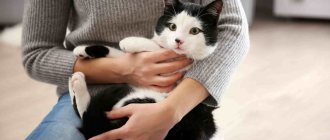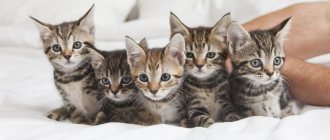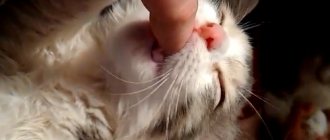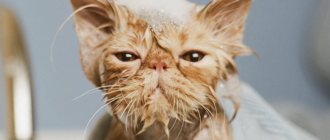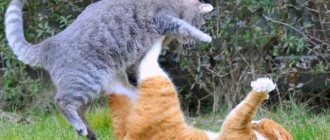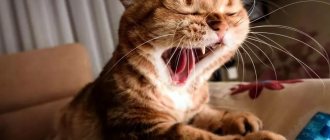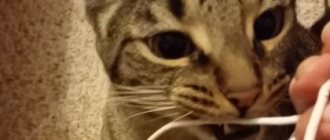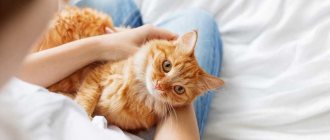Hunting instinct
Based on recent research, domestic cats are the most ruthless predators who love to play with their prey. Regardless of the breed, cats have a certain cruelty towards prey. There is no reason to be afraid of your pet and consider it a bloodthirsty killer if one day you see a dead bird or part of it on your bed. With this behavior, the cat does not want to scare anyone, but is waiting for praise. She demonstrates that she not only protects the territory from other animals, but also shares the food she gets with her owner.
Even those pets who are deprived of street walks are prone to hunting. The presence of an open window or balcony in the house can be a wonderful opportunity to hunt rodents, birds and bats. Unfortunately, such house hunting can end disastrously for owners living on high floors - cats often get lost or broken due to their instincts.
- Why mosquito bites itch and swell - a normal and allergic reaction to insect saliva
- Prague Rat - characteristics and description of the breed, coat type and color, keeping at home
- Pizza with mushrooms recipe with photos step by step
About hidden threats
One of the reasons why the owner must control the hunting instinct of his pet is if one of the residents of the house or apartment has musophobia (fear of rats and mice) or ornithophobia (fear of birds). Phobias are not nonsense or fiction: often irrational fear forces people to commit rash acts, because of which an innocent pet can suffer.
Another type of threat lies in wait for the cats themselves - these are diseases carried by animals from the street. From rats and mice you can become infected with rabies and distemper, as well as subcutaneous pests - ticks and lice, which, in turn, carry various viruses. In addition, there is a high probability that an animal caught by a cat will be poisoned with rat poison, and then your pet will become a victim of rodent poisoning. Birds can be carriers of fungal infections. Contact with any street animal can cause infection with worms.
Cats should not bring caught animals into the house, because they can greatly frighten the owner. Of course, this rarely happens, and if the owner is a hunter himself, then no mouse will scare him. But other owners, especially if they are female, may suffer from ornithophobia (fear of rats, birds, mice).
Another danger that such pet gifts pose is diseases carried by rodents. For cats themselves, the worst of them is leptospirosis. Cats die from this disease. Rats are often carriers of distemper and rabies, which also cause death in pets.
It is worth noting that the hunting instinct of cats sometimes develops on a global scale. We are talking about the fact that animals begin to hunt chickens, chicks, and ducklings in the neighbor's barn. And this already threatens the owners with scandals with their neighbors.
Parental instinct
Even the most expensive and delicious cat food cannot dampen the parental instinct if there are kittens in the house. In such situations, the cat strives to teach its offspring to eat properly. To show a clear example, she brings home half-dead or dead animals to the kittens. The cubs are attracted by the process of playing with the prey and the smell of fresh game; they enthusiastically watch their mother and even try to imitate her.
Neutered cats are no exception; they also have a parental instinct that extends to the owner. If one day you see a dead rat in the kitchen, there is a chance that your pet just wants to introduce you to what she thinks is the right diet.
Showing respect to the owner as a sign of gratitude
Some people argue that cats are selfish animals, incapable of true affection and love for their owner. In reality this is not the case. Cats are proud, but they are capable of gratitude, even if it looks very specific to humans. By sharing the food obtained with a person, the animal shows the highest degree of gratitude and affection.
- How to choose the best bank
- 10 products with estrogen that women need after 50
- It hurts to swallow
What is the danger of having trophies taken by a cat in your home?
The instinct to hunt is due to evolution, but this does not mean that you should just let go of the situation and allow your cat to bring killed animals into the house. This is dangerous not only for the family due to unsanitary conditions, but also for the animal. If one of your pets has musophobia, suriphobia or ornithophobia, then such a presentation of trophies from a pet can result in serious stress.
Particular attention to the problem should be paid to people who have a small child in their home. It is better to take all possible measures in advance to prevent the cat from bringing killed animals, than to later give it into the wrong hands or, even worse, throw it out onto the street. The greatest danger from hunting is the pet.
There are many factors that can negatively affect a pet’s health and life:
- Frequent walks in nature without proper care lead to the fact that the cat develops fleas, worms or piroplasmosis.
- When leaving your personal territory, there is a risk of fighting with dogs or a cat that can carry the panleukopenia virus (feline distemper).
- Hunting for rodents is dangerous due to poisoning or infection, as they are carriers of various viruses, including rabies.
- When going out onto the roadway, the animal can be hit by vehicles.
- When hunting poultry or neighbor's pigeons, there is a risk of being caught in a trap or being killed with a weapon.
Why do cats carry dead animals home?
Representatives of the cat family, living side by side with humans for several thousand years, managed to retain most of their instincts inherited from their wild ancestors. Many of them explain the fact why cats sometimes carry their prey to their owners. Among them:
- Hunting instinct. The body of predators, which are representatives of the cat family, requires large amounts of protein. A cat's main diet should be meat. Therefore, hunting habits are inherent in this animal by nature. Interestingly, the main thing is to catch the prey, and not to eat it. Having brought a mouse or a bird to the feet of the owner, the cat thus proudly demonstrates its success, asserting itself and showing masculinity. Many pets amaze with their ability to hunt not only mice, but also aquarium fish, insects, and lizards.
- Parental instinct. Similar behavior appears in females. In the wild, predators bring small killed animals and birds to their cubs, thereby teaching them to eat properly and then to hunt. Modern domestic cats also have a similar parental instinct. Females with kittens often bring half-dead prey into the house to their babies, who react to it with great interest. If there are no offspring to whom the accumulated experience can be passed on, the animal chooses the owner to fill this role. The cat brings the caught prey to him, thereby demonstrating its care.
- Mice and birds laid out on the floor, on the owner’s bed - the cat’s desire to declare the benefits it brings, to earn a little praise and gain recognition. This is another one of the instincts characteristic of domestic fluffies.
READ Food-related aggression
Whatever of these reasons may have caused the appearance of animals killed by a cat in the house, you should not punish or scold her for this.
Many lovers of purring pets are familiar with the situation when there is a bowl full of food in the kitchen, and the pet brings a mouse to the doorstep. Why do cats carry dead animals home? The answer to this question is not as simple as it might seem at first glance. Its roots go deep into human history.
Cats were domesticated by humans more than 10 thousand years ago in ancient Egypt. And until now, most of them manage to retain their instincts.
Cats carry dead animals home for the following reasons:
- Hunter's instinct. All cats require large amounts of protein, so the basis of their diet is meat, which they are used to getting during hunting. An interesting fact is that eating prey is not the goal of hunting. When a cat brings dead animals home to the feet of its owner, it shows its success, courage and dexterity, thereby asserting itself as a hunter. It’s not for nothing that nature gave her tenacious claws, sharp fangs, excellent vision, sensitive hearing and a developed vestibular apparatus
- Insects, mice, moles, birds, lizards brought home, and even aquarium fish can become victims of such instincts. Kittens begin to show their instinct as early as three months of age, when they try to catch their mother’s tail or objects that elude them. But cats hunt not only for food, but also for pleasure and amusement. After all, living at home and regularly receiving tasty food, the pet simply does not need additional food, and he brings home the killed animal for play.
- Showing concern. In the wild, cats bring killed animals to their kittens. Thus, they teach their offspring proper nutrition and a hunting lifestyle. When there is not a single kitten in the house, the cat shows its parental instinct towards the owner. If, however, a pet perceives a person as an adult creature, then having brought home a dead animal, he simply shares the prey, as would happen in the wild when united with other cat families.
- Showing gratitude. Having brought a dead mouse to the owner’s bed or on the doorstep, the animal makes a “gift” to the person, thanking him for the warmth and love that he gives him. Therefore, having received swearing or screams in response to such an act, the cat may completely lose trust in its partner or, even worse, begin to be afraid of him.
- Showing your importance. Having brought home and laid out dead animals on the floor, the cat expects praise from the owner and recognition of its usefulness. This pet simply needs to always know that it is useful and necessary for its owner.
- Territorial reason. By laying out killed animals around the house, the cat seems to mark the boundaries of the territory in which it is the main predator. Having shown its instinct and killed the animal, the cat does not want to part with the prey and leave it in an unknown place, that is, on the street. It is much safer, in her opinion, to bring the prey to familiar conditions, home.
It is very important to remember that when a cat brings home killed animals, you should never scold him for it.
Where to put the loot
When a domestic cat catches mice and brings them home, you need to be able to accept such “gifts” correctly.
The prey must be extremely carefully, observing all hygiene standards (wearing gloves), placed in a jar, bag or box and thrown away. There should be no cat nearby.
She must assume that her catch, brought home, was eaten by the owner. After the procedure, gloves should be thrown away and hands should be washed with antibacterial soap.
But, since an animal brought home can become a threat to the health of the cat’s owner, one should try to reduce such “supply of provisions” to a minimum.
The manifestation of instincts by bringing dead animals home in cats annually leads to the death of hundreds of pets. Why? This happens for reasons such as:
- poisoning;
- diseases carried by killed animals (distemper, rabies, leptospirosis). The threat can be either in the blood or saliva of the victim, or in retaliatory bites, which are fraught with suppuration and abscesses;
- killed animals can infect a cat with a fungal disease, helminths or mites.
In addition to the above-mentioned threats, a hunting cat runs the risk of falling under the wheels of a car, into traps in a protected area, into the eyes of a formidable dog, or into other dangerous situations. When trying to bring the prey home, a meeting with wild cats may end in trouble, which may not accept a stranger, and then the matter, at best, will end in a fight.
Another danger that hunting poses is that, having brought the prey home, the cat can simply scare the household. After all, many people experience fear, even phobias, at the sight of rats or insects.
Such a fear can in some cases lead to a real panic attack, a sharp rise in blood pressure or fainting.
There are cases when, after frequently bringing home the prey of dead animals, the owners gave away or sold the pet.
To avoid the unpleasant consequences of bringing home prey, the owner should think about buying a collar with a bell that prevents normal hunting, or an interactive toy that will replace real prey.
Before allowing your pet to go outside, it must be spayed or neutered.
Instead of a conclusion
Everyone knows that cats are predators, but not everyone knows why they bring prey into the house. Now that the reasons have been listed, owners of purring pets need to learn only one lesson: you should not scold the animal for hunting.
If the breadwinner instinct causes discomfort, then you just need to find solutions to this problem in purchased products or in easy adjustments to the pet’s upbringing.
By giving preference to more humane methods, cat owners can count on a quick positive result.
How should the owner react and should the pet be weaned from this habit?
Having discovered a dead animal in the bedroom, not every person is able to maintain composure. The reaction can be very varied. No matter how trivial it may sound, you need to calm down, pull yourself together and under no circumstances use physical force on your pet. Remember that the cat brought the prey into the house for its own personal reasons, and did not intend to frighten or cause inconvenience to the family. Excessive aggression can injure the animal and violate its trust and relationship with the owner.
To wean a cat from hunting, you need to show cunning and perseverance:
- Limit your cat's walks or make them safer so that she can't get into someone else's yard.
- Buy a special collar with a bell that will alert potential prey to danger.
- Review your pet's diet. If the food meets all the needs for vitamins, minerals and amino acids, then the cat will not have a strong desire to hunt and bring its prey into the house.
- Buy toys for active play at the pet store (balls, pen and wand, wind-up toys). The more energy your pet devotes to the game, the less desire he will have to hunt.
- Place mosquito nets on the windows to protect your pet from accidentally jumping out.
Gift for a friend
It happens that a pet brings a hunting trophy into the owner’s personal space. People who are lucky enough to keep a purring predator may find the body of a bird or mouse in their own bed or favorite slippers. If this happens, don't panic. This is how the cat proves its importance by telling its owner: “You see, I not only protect our territory, but I also feed you!”
When cats bring killed animals into the house, they consider the members of the household to be their relatives.
According to another version, cats bring prey to household members because they consider them their relatives. Stray and wild cats sometimes gather in small groups - prides, each member of which fulfills its own social role. In prides there are several mother cats who feed and raise their offspring. Responsibility for hunting and food lies with the rest of the pride.
